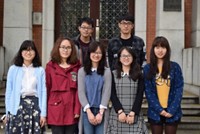Advertisement
Grab your lab coat. Let's get started
Welcome!
Welcome!
Create an account below to get 6 C&EN articles per month, receive newsletters and more - all free.
It seems this is your first time logging in online. Please enter the following information to continue.
As an ACS member you automatically get access to this site. All we need is few more details to create your reading experience.
Not you? Sign in with a different account.
Not you? Sign in with a different account.
ERROR 1
ERROR 1
ERROR 2
ERROR 2
ERROR 2
ERROR 2
ERROR 2
Password and Confirm password must match.
If you have an ACS member number, please enter it here so we can link this account to your membership. (optional)
ERROR 2
ACS values your privacy. By submitting your information, you are gaining access to C&EN and subscribing to our weekly newsletter. We use the information you provide to make your reading experience better, and we will never sell your data to third party members.
Education
Erik W. Thulstrup
Danish spectroscopist aids developing nations
by Sophie L. Rovner
February 19, 2007
| A version of this story appeared in
Volume 85, Issue 8

IF YOU NEED to reach Erik W. Thulstrup, you're as likely to track him down in Kenya or Vietnam as you are to find him in his native Denmark. This seemingly tireless spectroscopist shuttles around the globe to offer advice on how educational reforms in science—and especially chemistry—can help developing nations prosper.
In the early 1970s, an Indian visitor who designed low-cost pH meters and other instruments for schools and universities awakened Thulstrup's interest in the developing world. "I got involved in that," says Thulstrup, a chemistry professor at Denmark's Roskilde University. "I felt I had an obligation to help."
In 1984, the University of Nairobi's chemistry department asked Thulstrup to visit periodically to ensure that exams were conducted fairly and to recommend educational improvements. His input helped the department incorporate real-world issues in its student projects.
During his time in Nairobi, Thulstrup says, he was "struck by the immense amount of talent in Africa, and I wondered why that didn't lead to fast development. A few years later I went to China for the first time and had exactly the same thought."
China, of course, has since enjoyed a surge of technical development. So have South Korea and Singapore, which "were poorer than most African countries 35 years ago," Thulstrup notes. Why did these nations advance more rapidly than Africa? Their cultures have a "great appreciation for knowledge, and maybe it's not the same in Africa," he suggests. "And the Chinese government has recently made consistent, very sensible investments in higher education and research."
Thulstrup has spent a lot of time in China, helping top universities upgrade science and engineering education. He has also helped to modernize safety and environmental practices. Waste disposal practices, "even in those top universities, were often very poor," he recalls. "Everything went in the sink." But now, he adds, the "situation is greatly improved."
He also encouraged Chinese universities to update the traditional educational model, in which "students were mainly copying or following orders and memorizing things," Thulstrup says. The Chinese modified their curricula, cutting the number of lectures, allowing open-book tests, and permitting undergraduates to participate in research—thus encouraging students to think for themselves.
Most of Thulstrup's work in China was done in association with the World Bank in Washington, D.C., where he spent five years in the 1990s. During his tenure there, Thulstrup also pushed for changes in the evaluation of projects funded by the organization. The norm at the time was to check so-called project inputs, factors such as whether a funded building was built, the equipment had arrived, and the students went abroad for graduate studies. Thulstrup believed that "you should rather look at what came out of the investments: 'Was the new equipment used in the labs? Did it produce useful results? Did the students who studied abroad come home, and were they useful staff members after that?' " The World Bank now increasingly uses this type of outcome evaluation.
The training abroad of students from developing countries—and their eventual return home—is an issue of particular interest to Thulstrup. The developed world imports "a lot of bright talents in science and engineering from developing countries," he says. "This is okay for China and India. But for the small African countries, it can be a disaster."
Well-intended aid programs can exacerbate the problem. In the 1980s, for instance, the Canadian government offered Ph.D. fellowships at Canadian universities to numerous bright students from Ethiopia's Addis Ababa University. When Thulstrup traveled to Ethiopia to evaluate an unrelated program in 1995, "not a single student had returned," he says. "So this is not aid. This is the opposite of aid."
BY CONTRAST, Thulstrup points to a successful International Foundation for Science program that offers $12,000 grants to talented young scientists from developing countries to help launch their careers back home. Most of the grant recipients—many of whom have studied abroad—stay put once they've returned to their native countries, Thulstrup says. "They need some self-confidence, and the grant gives them that." The grants, which can be renewed twice, are usually used for equipment and supplies.
He recommends a number of things individual scientists in the developed world can do to help. For instance, they can send literature and used but functional equipment to colleagues in less developed countries or notify them when a key research paper is published. They can mentor a former grad student who returns to a developing nation to launch a career after graduation. They can carry out lab measurements for free, as Thulstrup does in his field of spectroscopy. Thulstrup also helped launch a program that pays for Vietnamese graduate students to conduct research at his university. The work serves as the basis for the students' degrees at their home university. The program relieves pressure on the Vietnamese university system, which lacks research funding as well as laboratory and library facilities.
Thulstrup is well aware of the challenges for science in developing nations. But he believes that many of these countries, as well as small nations in Latin America and Africa, could follow the examples of science-based development demonstrated by Singapore, South Korea, China, India, Brazil, and more recently Pakistan and Nigeria. "Too many countries do not benefit enough from their main resource: human talent," he says. "The international scientific communities should be able to help them do better."




Join the conversation
Contact the reporter
Submit a Letter to the Editor for publication
Engage with us on Twitter